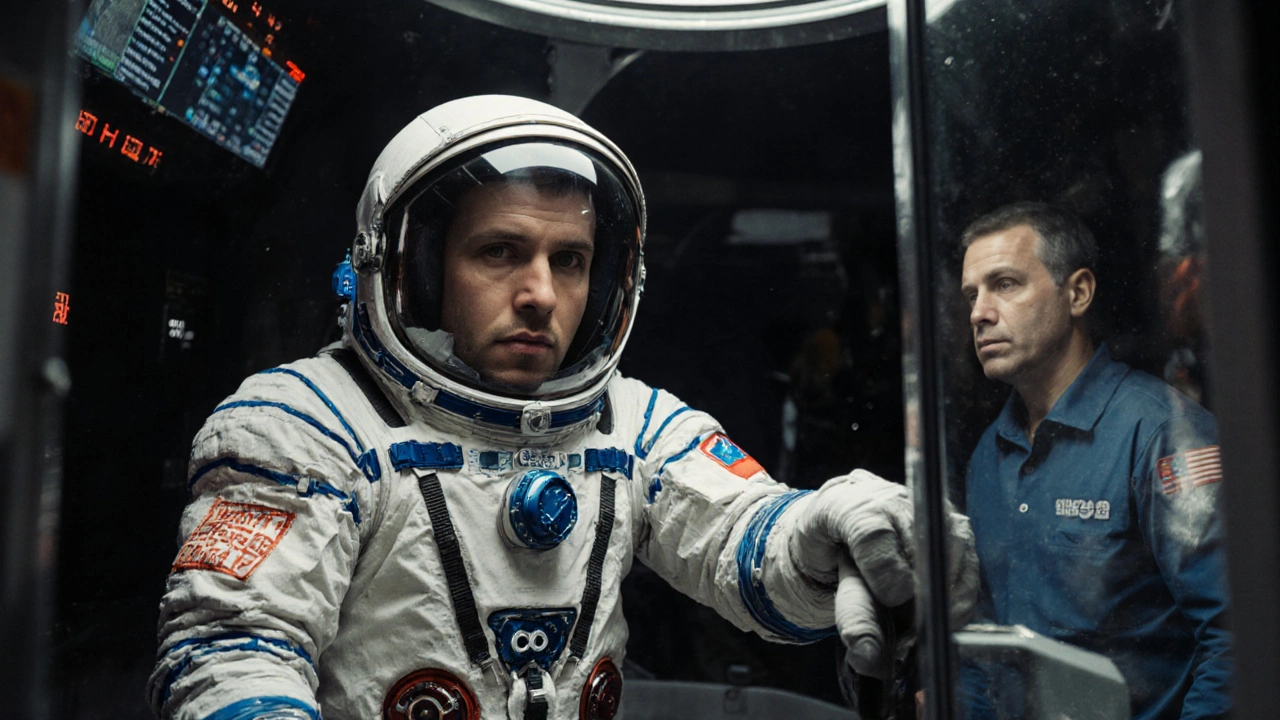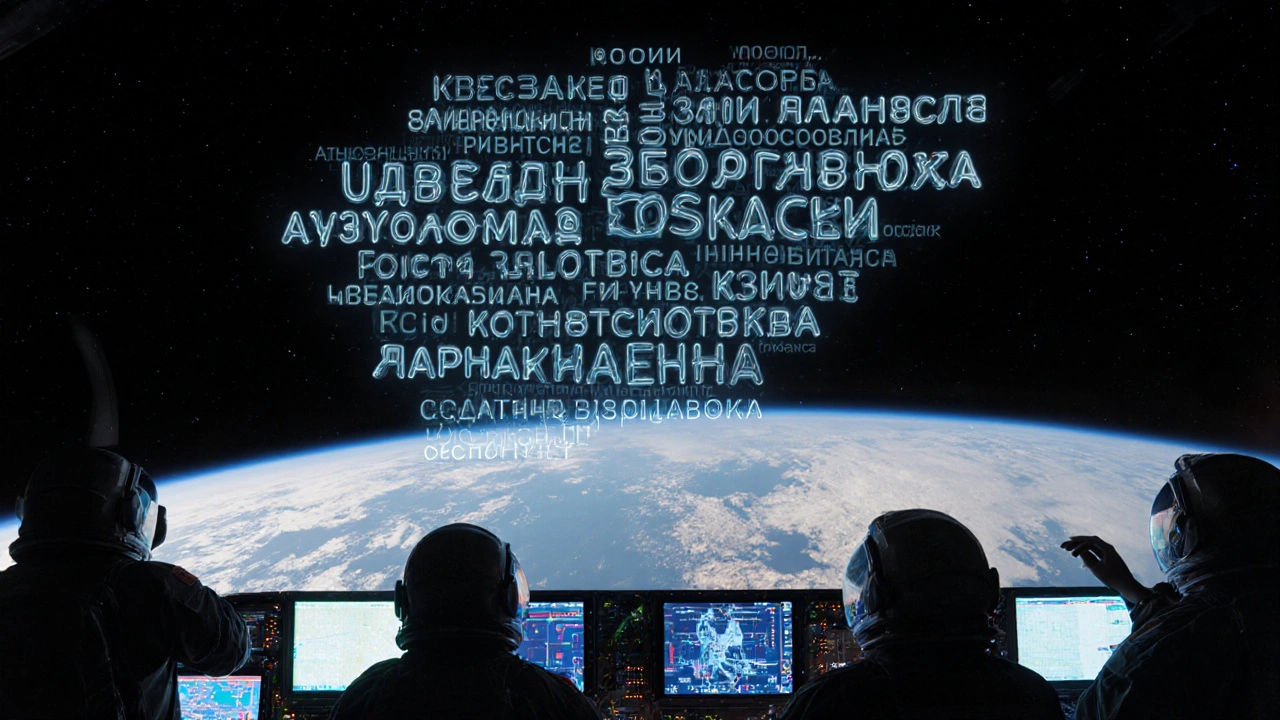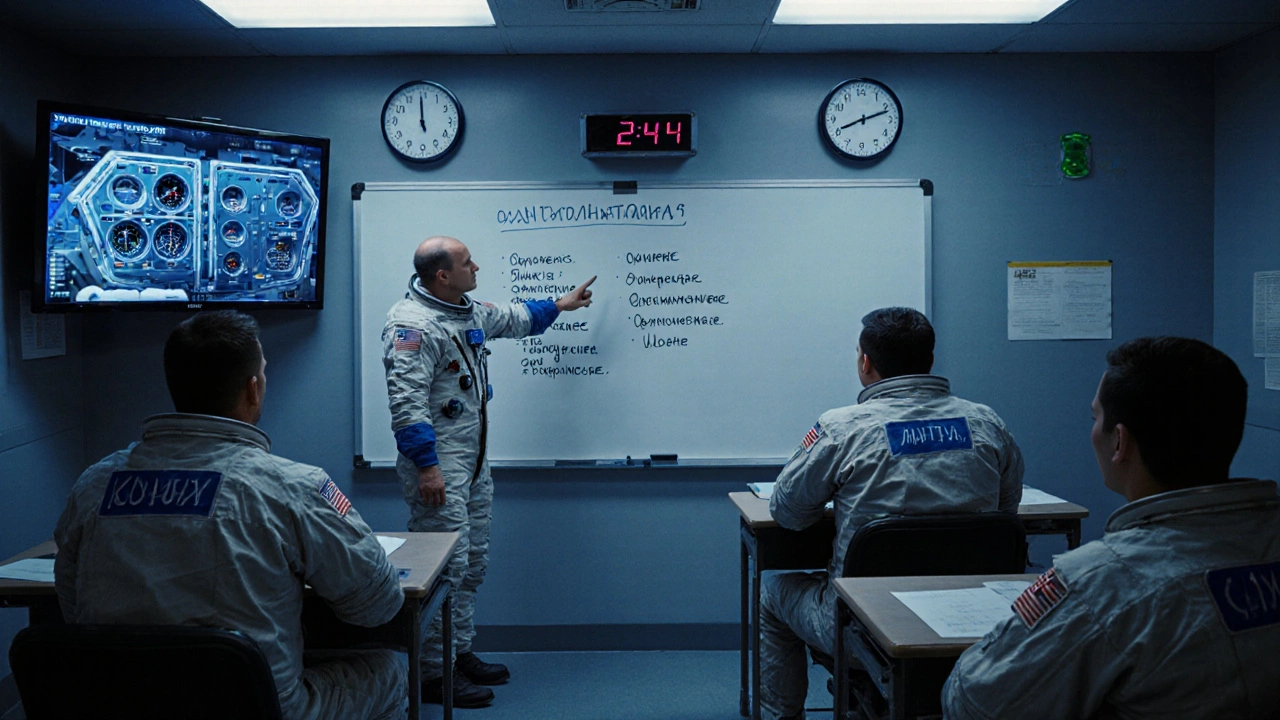Every astronaut heading to the International Space Station - no matter their country - must learn Russian. Not just a few phrases. Not just enough to say "thank you" or "hello." They need to understand emergency alarms, docking commands, and life support warnings spoken rapidly in Russian, without delay, without translation, and under pressure. This isn’t optional. It’s a hard requirement, built into the training from day one.
Why Russian? It’s Not About Culture - It’s About Survival
The reason is simple: Russian is the operational language of the Soyuz spacecraft and the Russian segment of the ISS. When the station flies over Russian territory, mission control in Korolyov, near Moscow, takes over communication. If something goes wrong - a fire, a leak, a system failure - the crew has to respond in real time, using the same words the controllers are using. There’s no time to wait for an interpreter. No time to pause and think. In 2019, a fire alarm went off while the ISS was over Russian airspace. NASA astronaut Anne McClain had to coordinate directly with Moscow control, understanding every command, confirming every action, all in Russian. She didn’t have the luxury of switching to English. That’s the reality. And it’s why NASA and its partners treat Russian language training like a critical safety system - not a language class.What Level of Russian Do Astronauts Need?
Astronauts aren’t expected to become poets or novelists in Russian. They need to reach ILR Level 2+, a standard set by the U.S. Department of State’s Foreign Service Institute. That’s roughly equivalent to being able to hold a 30-minute technical conversation about spacecraft systems without stumbling, mispronouncing, or needing help. The test isn’t written. It’s spoken. Over the phone. With a certified examiner. The astronaut has to describe how to shut down a coolant loop, explain what a pressure alarm means, or respond to a simulated cabin depressurization - all in Russian. They need to understand 85% of what’s said, without pauses. Most people who fail the test don’t lack vocabulary - they lack speed. They freeze when the Russian comes fast, which is exactly how it sounds in real emergencies.How Do Astronauts Actually Learn It?
Training starts early - often before astronauts even get assigned to a mission. It begins at NASA’s Johnson Space Center in Houston or at the Defense Language Institute in Monterey, California. At first, it’s one or two lessons a week. But as launch day approaches, it ramps up. During the final 6-12 months before launch, astronauts spend 3-4 hours a day, five days a week, studying Russian. The real test comes in Star City, Russia. That’s where the cosmonauts train. And that’s where NASA astronauts go for immersion. For weeks at a time, they live in Russia. They eat with Russian families. They take classes in Russian. They practice emergency drills in Russian. They sit in Soyuz simulators while instructors shout commands in Russian, correcting every mispronunciation. One astronaut described it as being “a first-grader in a classroom where no one speaks your language.” The curriculum isn’t about grammar rules or verb conjugations. It’s about survival vocabulary. About 70% of training time focuses on technical terms: давление (pressure), уровень кислорода (oxygen level), аварийная посадка (emergency landing), пожар (fire). There are over 2,000 terms they must know cold. And they must recognize them instantly - even if spoken in a panicked voice.
It’s Not Just About Speaking - It’s About Listening
Many astronauts say the hardest part isn’t speaking - it’s understanding. Russian mission control doesn’t speak slowly. They don’t repeat themselves. They use shorthand. They cut words. They assume you know the context. One veteran astronaut recalled hearing a command like “Снижение на 0.3” - meaning “lower by 0.3.” In English, that’s clear. In Russian, spoken fast over a crackling radio, it sounds like “Sneezh-eh-nee-ye na nol’ tri.” If you’re not used to it, you miss it. And missing it can mean missing a maneuver, or worse. That’s why astronauts train with recordings of real mission control transmissions. They replay them. They transcribe them. They listen until they can pick out commands in their sleep. Some even hang out with Russian cosmonauts during downtime - not to socialize, but to practice. One astronaut said, “The best teacher wasn’t my instructor. It was the guy who fixed the coffee maker in Star City. He didn’t know I was training. He just talked. And I learned.”What Happens If You Don’t Pass?
Failure rates on the final Russian proficiency test hover around 15%. That’s high for a program that selects only the most elite candidates. Those who don’t pass the first time get more training. But they can’t fly until they do. No exceptions. No delays. No compromises. There’s no room for ego. NASA astronaut Shannon Lucid, who spent 188 days aboard Mir in 1996, had to learn Russian from scratch because her crewmates spoke no English. She said they eventually developed their own “cosmic language” - mixing Russian, English, gestures, and laughter. But that wasn’t by design. It was survival. In the Shuttle-Mir program, inadequate language skills caused real problems. John Blaha, a NASA astronaut on Mir, called it “NASA’s biggest mistake.” Crews couldn’t communicate clearly during emergencies. Procedures were misunderstood. Trust broke down. Since then, the rules changed. Now, you don’t get to the ISS unless you can speak Russian like a technician - not like a tourist.


15 Responses
It's fascinating how language becomes a lifeline in space, isn't it? We spend so much time debating cultural diplomacy, but here we are-human survival pinned to verb conjugations and emergency lexicons. No one talks about how this requirement flattens ego. You can't be a genius astronaut if you can't say 'давление' without choking. It's not about politics. It's about humility.
Why the hell do we still let the russians dictate the rules? We got dragon now. We got starliner. Why are we still kissing their butt for a language we dont even speak in real life? This is just soviet legacy brainwashing. Time to switch to english. Full stop.
Let me be clear: anyone who thinks language training is optional for space missions is dangerously naive. This isn't a language class-it's a survival protocol. If you can't understand a panicked Russian voice screaming 'пожар' during a fire, you don't belong in orbit. Period. End of story. No exceptions. No excuses. No 'maybe next time.' You fail the test, you stay on the ground. That's how it should be.
I love how this story shows that even in space, we're still just humans trying to get along. No one's perfect, no one speaks flawless Russian, but they show up anyway. They practice. They listen. They make mistakes and keep going. That’s the real lesson here-not the grammar, not the vocabulary-but the willingness to learn from each other, even when the stakes are this high. Kinda beautiful, really.
They say its about safety but whats really happening is the russians are using this to keep control. You think they really need us to learn russian? Nah. They need us to be dependent. Every time you say 'уровень кислорода' you're signing a contract you didnt read. They know we cant launch without them. So they make us learn their tongue. Its psychological domination. And we're okay with it
Think about it. We send people to the edge of the atmosphere, into the silent void, and the thing that keeps them alive isn't the tech, isn't the oxygen, isn't the suits-it's a language. A fragile, living thing passed down through generations of engineers and cosmonauts. Russian is the ghost in the machine. It's the whisper in the static. It's the last thing you hear before everything goes dark. And you better pray you understood it.
There's a typo in the article. It says 'Soyuz is the only spacecraft currently certified'-but it should be 'Soyuz is the only spacecraft currently certified.' Missing period after 'certified.' Also, 'аварийная посадка' is misspelled as 'аварийная посадка' in the original text. That's not even close. And 'Sneezh-eh-nee-ye na nol’ tri'-that's not how you transliterate. It's 'Snizheniye na nol' tri.' You can't just make up phonetics. This is embarrassing.
This isn't just about training-it's about trust. When an astronaut hears 'снижение на 0.3' in the middle of a crisis, they're not just hearing a command. They're hearing the voice of someone who's spent years mastering this. Someone who didn't have to learn it, but chose to. That moment-when the fear in your chest meets the clarity of a well-practiced phrase-is the moment humanity proves it can rise above borders. Language becomes the bridge when the sky becomes the wall.
So they just have to learn the words? Like, no grammar? Just say the right thing when the alarm goes off? That's it? No studying? Just memorize?
Oh honey, I just love how this is framed like some noble sacrifice. Please. It's not about survival-it's about legacy. The Russians knew they'd control the ISS's backbone, so they made sure the whole world had to grovel to their language. And now we all pretend it's 'for safety.' It's not. It's colonialism with a spacesuit. I'm just saying. Also, I took Russian in college. I know what 'давление' sounds like. And yes, it's beautiful. But it's also a power move.
I think it's interesting that we never talk about the emotional toll. Imagine being the only American in a room full of Russians, all speaking fast, all expecting you to know everything. You're not just learning a language-you're learning how to be invisible while still being responsible for your life. That's exhausting. And nobody ever says that.
Canada's doing the same thing? That's just surrendering our identity. We got our own language. We got our own tech. Why are we bowing to Moscow? This is pathetic.
So let me get this straight... we send people to space, and the most dangerous thing they face isn't radiation or microgravity-it's a Russian guy yelling over a radio with a cigarette in his mouth? That's the real ISS horror story. I'm not even scared of space anymore. I'm scared of Russian mission control's tone of voice.
They say 'no exceptions'-but let's be real. The ones who fail? They're probably the ones who didn't study because they thought they were too good. The real astronauts? They're the ones who showed up at 5 AM, drilled with audio files while brushing their teeth, and cried because they couldn't get 'пожар' right on the third try. This isn't about talent. It's about discipline. And most people don't have it.
Kinda makes you think. We build these incredible machines, launch them into orbit, and the thing that keeps it all together is just a bunch of people trying to understand each other. No flags. No politics. Just words. Maybe that's the real miracle here.